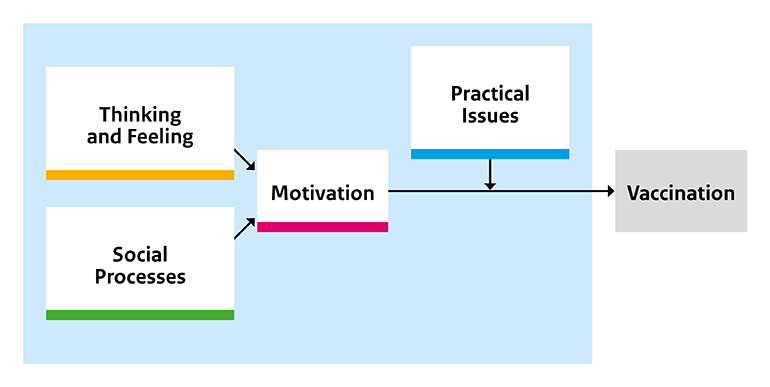Most children in the Netherlands take part in the National Immunisation Programme. Participation is high enough that fewer people become seriously ill or die from infectious diseases. But the participation rate (or vaccination coverage) does not always stay steady at that high level. It is higher in some groups than in others. If fewer people are vaccinated, then the Netherlands will see more people becoming ill, and more outbreaks of the diseases that we vaccinate against. That is why RIVM launched the SocioVax research programme. Through SocioVax, we are researching what could help increase vaccination coverage. For example, we explore how communication about the National Immunisation Programme can better meet parents’ needs. And we look at ways to maximise ease of access to the vaccination programme so it is available to everyone.
Aims of the SocioVax research programme
SocioVax aims to answer the following questions:
- How do people choose whether or not to participate in the National Immunisation Programme?
- What differences do we observe between people, and how can we explain those differences?
- Why does participation in vaccination change over time?
- How can we inform people and help them choose?
- How can we offer vaccination programmes in such a way that participating is as easy as possible?
- How can we support organisations working in Youth Healthcare Services (JGZ) with the knowledge from this research?
The 3 main aims of SocioVax are listed below.
- Understanding why people choose whether or not to be vaccinated
In the SocioVax programme, we are researching participation in vaccination based on various factors. This includes socio-demographic, socio-psychological and environmental factors. In this context, we also look at differences in participation in vaccination, and at how participation in vaccination changes over time. - Knowing what works
Through SocioVax, we want to research how we can inform people more effectively about vaccination, and how we can offer people more effective assistance in making choices about vaccination. We also want to know how to maximise ease of access to vaccinations. In this context, we pay particular attention to the groups that we are not currently reaching to a sufficient extent. - Sharing knowledge
The knowledge acquired from SocioVax is shared with professionals and policy-makers working in the field of communication about and implementation of vaccination programmes.
SocioVax results
SocioVax encompasses multiple studies. Read more about the studies and their results by clicking on the links below:
- Literature review and discussions with youth healthcare professionals about:
- determinants or circumstances play a role in choosing whether or not to be vaccinated.
- actions, strategies and measures that could increase vaccination coverage.
- Survey-based monitor (since 2024) on beliefs and opinions about and experiences with vaccinations among parents of children in the age group for the National Immunisation Programme (0–18 years).
- In-depth and intervention-based research on concerns and needs of people from various groups and in various situations, as well as testing new interventions. This is a joint effort with the Municipal Public Health Services (GGDs) and the Youth Healthcare Services (JGZ). The results will be made available in due time.
Behavioural and social drivers of vaccination
Our research makes use of the model on ‘Behavioural and social drivers’ provided by the World Health Organization (WHO). The model maps out four domains that influence the decision to get vaccinated, and shows how those domains interact. The explanatory notes below offer more details about the domains.
The model on ‘Behavioural and social drivers’ provided by the World Health Organization (WHO) maps out four domains that influence the decision to get vaccinated:
- Thinking and feeling, such as:
- the perceived disease risk
- vaccine confidence (e.g. perceived benefits, safety and trust in institutions) - Social processes, such as:
- social norms (includes support of family and religious leaders)
- recommendations from health workers - Motivation, such as:
- the intention to get the recommended vaccinations - Practical issues, such as:
- availability
- affordability
- ease of access
- service quality
Source: based on the WHO behavioural and social drivers of vaccination framework; World Health Organization BeSD working group (2022).
Supporting healthcare professionals
SocioVax focuses primarily on the National Immunisation Programme for children and adolescents aged 0–18 years. Some sub-studies also offer insights into adult vaccinations, such as the flu vaccine. The outcomes are intended to support professionals, government administrators and policy-makers in the public healthcare system.
Contact
Would you like to be updated about the SocioVax results? Then sign up for the newsletter about the National Immunisation Programme. If you have questions, please contact the researchers at sociovax@rivm.nl.
